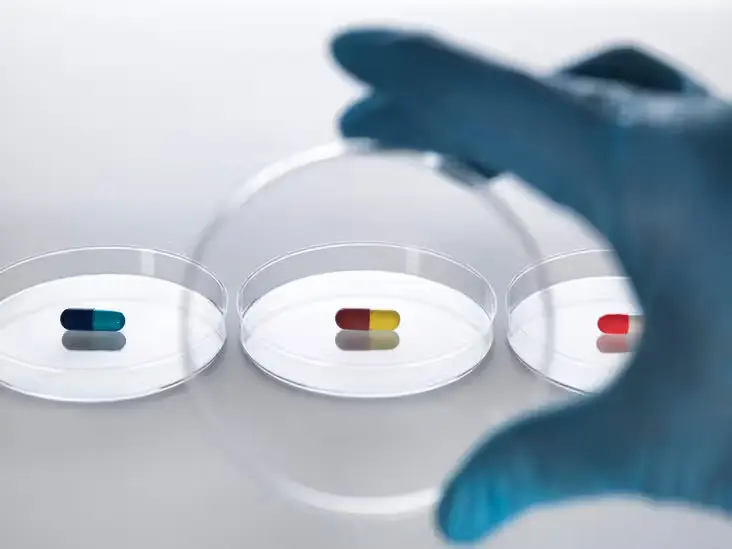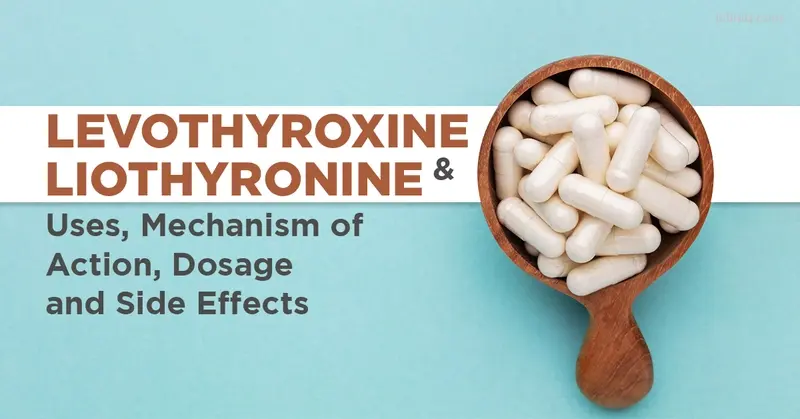Liothyronine and levothyroxine are two synthetic hormones prescribed for the treatment of hypothyroidism, a condition where the thyroid gland is underactive and does not produce sufficient amounts of hormones. These medications help to restore the balance of thyroid hormone in the body and alleviate symptoms associated with this condition. Liothyronine, known as T3, is the active form of thyroid hormone that the body can utilize immediately, while levothyroxine, referred to as T4, is a prohormone that the body converts into the active form over time.
The decision between liothyronine and levothyroxine is significant, as they offer different pros and cons and may affect individuals differently. Levothyroxine is the standard treatment for hypothyroidism and is preferred by most clinicians due to its steady state and once-daily dosing. On the other hand, liothyronine is faster acting, but its effects are shorter-lived, which may require multiple doses throughout the day. Both medications have side effects and risks that should be considered alongside their benefits. The choice may also be influenced by patient characteristics, preference, and their overall quality of life.
Quick Summary
- Liothyronine and levothyroxine are thyroid hormone replacements with distinct properties.
- Levothyroxine is preferred for its stable levels and ease of administration.
- Consideration of side effects, patient preference, and quality of life is crucial for therapy choice.
What is Hypothyroidism

Hypothyroidism, also known as an underactive thyroid, is a condition where the thyroid gland fails to produce sufficient thyroid hormone. This hormone plays a crucial role in metabolism, growth, and development. Insufficient levels can affect various bodily functions.
Symptoms can vary from mild to severe and may include:
- Fatigue
- Weight gain
- Cold intolerance
- Dry skin
- Muscle weakness
- Depression
- Impaired memory
These symptoms could be subtle and often progress slowly over years. It’s important to recognize that they can be mistaken for other conditions, underscoring the importance of proper diagnosis.
The Thyroid Gland, located at the front of the neck, produces two main hormones: thyroxine (T4) and triiodothyronine (T3). In hypothyroidism, when the gland’s activity is below the necessary level, the body’s overall metabolism is slowed down.
Diagnosis typically involves the assessment of thyroid-stimulating hormone (TSH) and T4 levels through blood tests. If the TSH level is high and T4 is low, it often indicates an underactive thyroid.
Treatment typically involves daily use of synthetic thyroid hormone medication. Levothyroxine is the most commonly prescribed form as it is identical to T4. Some patients may require an alternative or additional medication like liothyronine, which is synthetic T3, depending on how their bodies respond to treatment.
Liothyronine and Levothyroxine Overview

In managing hypothyroidism, liothyronine and levothyroxine offer distinct approaches, as they are different forms of thyroid hormones. The following sections detail the specifics of these medications.
What is Liothyronine?
Liothyronine is a synthetic form of triiodothyronine (T3), the thyroid hormone responsible for regulating metabolism, heart rate, and body temperature. It is commonly known by the brand name Cytomel, and it replicates the action of the natural hormone produced by the thyroid gland. This medication specifically addresses the body’s T3 levels, and it’s often used when conversion from T4 to T3 is impaired or when a rapid onset of action is required.
What is Levothyroxine?
Levothyroxine, also referred to as L-thyroxine, is a synthetic version of thyroxine (T4), another primary hormone produced by the thyroid gland. Brands like Synthroid are well-recognized forms of this medication. Levothyroxine focuses on restoring normal T4 levels, which the body ultimately converts to T3. It is the standard treatment for hypothyroidism due to its steadier levels and longer half-life, allowing for once-daily dosing.
Comparative Analysis: Liothyronine vs Levothyroxine

This section examines the effectiveness and impact on thyroid function tests comparing Liothyronine and Levothyroxine, two mainstays in thyroid hormone replacement therapy for hypothyroidism.
Effectiveness in Treating Hypothyroidism
Levothyroxine (T4) is the standard treatment for hypothyroidism, aiming to restore normal thyroid hormone levels and alleviate symptoms. Patients with primary hypothyroidism typically experience an improvement in their quality of life once treated with Levothyroxine, as it stabilizes serum TSH (thyroid-stimulating hormone) and serum T4 levels. On the other hand, Liothyronine (T3) is sometimes used, either alone or in combination with Levothyroxine, when individuals do not respond adequately to T4 alone. This combination may be preferred by some patients, potentially leading to an enhanced quality of life and better management of hypothyroid symptoms.
Impact on Thyroid Function Tests
Liothyronine treatment requires careful monitoring since its use can significantly alter thyroid function tests, including serum TSH and serum T3 levels. TSH suppression is a concern for clinicians, as over-suppression can lead to adverse consequences, such as increased risk of osteoporosis and cardiac issues. Levothyroxine tends to have a more predictable effect on serum TSH levels, allowing for easier titration of dosage. Monitoring for Liothyronine often requires more frequent testing of serum T3 to prevent over-replacement or under-replacement of thyroid hormone.
Advantages of Liothyronine

Liothyronine is a synthetic form of the triiodothyronine (T3) hormone, which plays an integral role in the body’s metabolic processes. One of its prominent advantages is its effectiveness in addressing hypothyroid symptoms where levothyroxine (T4) therapy alone is insufficient. Unlike levothyroxine, liothyronine is the active hormone, which can be beneficial for patients who have difficulties converting T4 into T3.
For individuals struggling with weight management, liothyronine may aid in weight loss. It is known to accelerate metabolic rate, leading to an increase in caloric expenditure. This property makes liothyronine a potentially useful adjunct in weight reduction for patients with an underactive thyroid.
Patients often report an improvement in energy levels when taking liothyronine. Since T3 is directly involved in energy production and metabolism, adequate levels help sustain normal energy states, circumventing the persistent fatigue associated with hypothyroidism.
In terms of mental health, there is evidence suggesting that the addition of liothyronine can improve mood and cognitive function. Some patients with depression and hypothyroidism see an improvement in symptoms when T3 is added to their treatment regimen, potentially related to T3’s faster action and effect on neurotransmitters compared to T4.
It is important to understand that while liothyronine has these advantages, it must be prescribed and monitored by a healthcare professional due to its potency and the precision required in dosing to avoid adverse effects.
Advantages of Levothyroxine

Levothyroxine is a synthetic form of thyroxine (T4), a hormone naturally produced by the thyroid gland. By supplementing the body’s T4 levels, levothyroxine effectively treats hypothyroidism. Its structure is identical to that of endogenous T4, which ensures biochemical stability and activity within the body.
One significant advantage of levothyroxine is its ability to maintain stable serum levels. Patients generally achieve consistent concentrations by taking the medication once daily, largely due to its long half-life. As a result, this stability makes it easier to monitor and adjust dosages as needed.
In terms of cost-effectiveness, levothyroxine offers an economical option for patients. It is widely available as a generic formulation, which reduces the financial burden for both patients and healthcare systems.
The dosage of levothyroxine can be tailored to individual patient needs, allowing for fine-tuning based on a patient’s body weight, age, and thyroid function tests. Its availability in a wide range of dosages facilitates this personalization.
Side Effects and Risks

When considering treatment options for thyroid disorders, understanding the potential side effects and risks associated with liothyronine and levothyroxine is crucial. Patients may experience varied side effects based on their individual reactions and the specific medication used.
Liothyronine Side Effects
Liothyronine, a synthetic form of the T3 hormone, can cause several side effects. Notable side effects include:
- Heart palpitations and atrial fibrillation: Can increase the risk, particularly in elderly patients or those with cardiac history
- Bone health concerns: May contribute to osteoporosis if overused or not carefully monitored
- Nervous system effects: Anxiety, insomnia, nervousness, and even potential depression.
Patients experiencing side effects that are severely impacting their quality of life should consult with a healthcare professional.
Levothyroxine Side Effects
Levothyroxine, a synthetic T4 hormone, also carries a risk of side effects. These include:
- Cardiovascular effects: Rarely, it may cause atrial fibrillation, especially if dosages are higher than needed
- Endocrine concerns: Over-replacement can lead to osteoporosis and other hormone-related issues.
- Metabolic effects: Hair loss, cold sensitivity, fatigue, and sometimes depression may occur.
Dosage and Administration
Proper dosage and administration of liothyronine and levothyroxine are crucial for their effectiveness and safety. Patients typically require careful titration to achieve optimal therapeutic levels.
Liothyronine Dosage Considerations
Liothyronine is a synthetic form of the thyroid hormone triiodothyronine (T3) and is available in tablet form. Dosage is highly individualized and must be titrated based on the patient’s clinical response and laboratory parameters. It is typically started at a low dose, such as 5 mcg once per day, with gradual increments every 1 to 2 weeks. Close monitoring of thyroid function tests is necessary to avoid over-treatment, which can lead to serious side effects.
Typical starting dosage: 5 mcg/day
Titration: Increase by 5 mcg every 1-2 weeks
Monitoring: Frequent thyroid function tests
Levothyroxine Dosage Considerations
Levothyroxine is a synthetic form of the thyroid hormone thyroxine (T4) and is the standard treatment for hypothyroidism. The starting dose is typically based on the patient’s weight and can be approximately 1.6 micrograms per kilogram per day. Administration is advised to be on an empty stomach, ideally 30 minutes to an hour before breakfast. Absorption can be affected by dietary supplements; therefore, levothyroxine should be taken at least 4 hours apart from calcium or iron supplements to avoid interference.
Starting dose: ~1.6 mcg/kg/day based on weight
Administration: On an empty stomach, 30-60 minutes before breakfast
Interactions: Separate from calcium and iron supplements by 4 hours
Titration: Adjusted based on regular thyroid function tests
Combination Therapy

Combination therapy for hypothyroidism includes using both levothyroxine (T4) and liothyronine (T3). It’s an alternative for patients experiencing persistent hypothyroid symptoms with monotherapy, typically levothyroxine alone.
Pros
- Symptom Improvement: Some patients report better quality of life and reduction in symptoms with combination therapy.
- Tailored Treatment: Allows for individualized dosing of T3 and T4 to meet specific patient needs.
Cons
- Complexity: Managing two medications requires closer monitoring of thyroid levels.
- Limited Guidelines: There is a lack of consensus in medical guidelines regarding combination therapy.
- Side effects: Risk of overstimulation and symptoms of hyperthyroidism due to the more potent effect of T3.
Patients should consider discussing the potential benefits and risks with their healthcare provider. They may also require regular blood tests to ensure thyroid levels remain within the target range.
When to Consider Combination Therapy
- If monotherapy with levothyroxine does not alleviate all hypothyroid symptoms.
- Patients with a poor quality of life despite T4 levels within the therapeutic range.
Special Considerations

When considering the use of liothyronine or levothyroxine, especially during pregnancy or in the presence of conditions such as diabetes and cancer, it is crucial to consult with a healthcare provider. The patient’s individual health status, including any genetic polymorphisms that affect thyroid hormone conversion, should guide the tailored treatment approach.
Liothyronine in Pregnancy
Liothyronine (T3) should be approached with caution during pregnancy. Healthcare providers may be hesitant to prescribe it as the primary treatment due to the lack of extensive research on its safety in pregnant women. It is also challenging to maintain T3 within the narrow reference range required for a healthy pregnancy.
- Pros: Potential benefit for those with T4 to T3 conversion issues.
- Cons: Limited research; risk of under or over-replacement.
Levothyroxine in Pregnancy
Levothyroxine (T4) is generally preferred during pregnancy as it has a long track record of safety and can be easily adjusted to achieve and maintain thyroid hormone levels within the recommended reference range for pregnant patients.
- Pros: Widely studied; known to be safe during pregnancy.
- Cons: Issues can arise if genetic polymorphisms affect hormone conversion.
Thyroid Hormone Conversion Issues
Some individuals have genetic variations that can impair the conversion of T4 to T3, potentially causing lingering symptoms even when T4 levels are within the reference range. Physicians might need to adjust the standard treatment approach based on the patient’s unique genetic profile.
- Pros: Tailored treatments can aid those with conversion issues.
- Cons: Requires thorough monitoring and may complicate standard treatment protocols.
Patient Preference and Quality of Life

When considering liothyronine versus levothyroxine, patient preference often plays a crucial role. Treatment preference is informed by individual experiences with side effects, efficacy, and personal daily functioning. A pivotal factor is quality of life, which includes an array of subjective well-being measures, such as fatigue, mood, and energy levels.
Patients report varying responses to liothyronine and levothyroxine, which impacts their preference. In some cases, liothyronine, which is a synthetic form of the T3 hormone, is linked to an improvement in energy and mood. This can be particularly relevant for patients who continue to experience fatigue on levothyroxine, a T4 hormone that the body converts to T3.
- Liothyronine
- Pros: Potential reduction in fatigue, positive impact on mood
- Cons: Greater complexity in monitoring levels, risk of over-replacement
- Levothyroxine
- Pros: Well-established treatment, longer half-life allowing once-daily dosing
- Cons: Some patients report persistent fatigue, lack of improvement in mood
A patient’s sense of well-being may be intimately tied to their hormonal balance, and therefore, sensitivity to thyroid hormone therapy can differ markedly. Clinical studies suggest that a subset of patients prefer liothyronine due to the more immediate relief of hypothyroid symptoms, while others favor the stability provided by levothyroxine.
The challenge for clinicians lies in tailoring treatments to individual patient needs and preferences, which requires diligent assessment and potential trial and error with medication types and dosages. Regular follow-ups are essential to ensure that thyroid hormone replacement therapy effectively optimizes quality of life without introducing adverse effects.
Discussion on Natural Thyroid Extracts

Natural Thyroid Extracts, particularly Natural Desiccated Thyroid (NDT), have been used for managing hypothyroidism as an alternative to synthetic hormones. These extracts are derived from the thyroid glands of animals and are thought to offer a more “holistic” approach by including a range of thyroid hormones, not just thyroxine (T4).
Natural Desiccated Thyroid (NDT)
Natural Desiccated Thyroid, commonly known under brand names such as Armour Thyroid and Nature-Throid, contains both thyroxine (T4) and triiodothyronine (T3), as well as other thyroid hormones present in the natural gland. Advocates suggest that this composition closely mimics the hormone profile produced by the human thyroid gland. Pros of using NDT include:
- Mimicry of Natural Hormone Levels: Some patients report improved symptoms on NDT, suggesting it might more closely mimic the body’s natural rhythms.
- T3 Content: It provides direct levels of T3, which could be beneficial for individuals who have difficulty converting T4 to T3.
However, there are also Cons to consider:
- Inconsistent Hormone Concentrations: The levels of hormones in animal thyroids can vary, potentially leading to inconsistencies in dosing.
- Risk of Overdose: Patients may face challenges in finding the correct dosage, increasing the risk of symptoms of hyperthyroidism.
Desiccated Thyroid Extract vs Synthetic Hormones
Comparing Desiccated Thyroid Extract to synthetic hormones such as Synthroid (levothyroxine) and Cytomel (liothyronine), reveals some differences. Synthetic hormones offer pure and consistent dosing of individual thyroid hormones, predominantly T4 for Synthroid and T3 for Cytomel. Pros for synthetic hormones include:
- Consistency: Synthetically manufactured hormones have consistent potency, which can facilitate correct dosage adjustments.
- Lower Risk of Allergic Reactions: Because synthetic options contain fewer protein contaminants, they are less likely to cause allergic reactions.
The Cons for synthetic hormones are:
- Potential Conversion Issues: Some patients might find it difficult to convert synthetic T4 into the active T3 hormone, which NDT naturally contains.
- Perception of Incompleteness: Patients who continue to experience symptoms on synthetic hormones may believe that the single hormone treatment is incomplete compared to the breadth of hormones found in NDT.
Guidelines and Associations’ Perspectives
When comparing liothyronine and levothyroxine in the management of thyroid diseases, it is crucial to consider the recommendations from various authoritative associations. Each organization examines evidence from clinical trials, meta-analyses, and subgroup analyses to provide guidelines that endocrinologists and other healthcare professionals rely on for best practices.
American Thyroid Association Recommendations
The American Thyroid Association (ATA) guidelines emphasize a preference for levothyroxine (LT4) as the standard of care for hypothyroidism based on a strong body of evidence. These guidelines suggest that liothyronine (LT3), alone or in combination with levothyroxine, is not routinely recommended due to a lack of consistent evidence for superiority and concerns about maintaining stable thyroid hormone levels.
- Preference: Levothyroxine (LT4)
- Concerns Regarding Liothyronine (LT3): Lack of superior evidence, difficulty in maintaining stable thyroid hormone levels
British Thyroid Association Recommendations
The British Thyroid Association (BTA) provides very similar guidance to the ATA. Levothyroxine monotherapy remains the cornerstone of treatment for hypothyroidism. The BTA acknowledges that some patients may continue to experience symptoms despite adequate levothyroxine treatment and the normalisation of thyroid-stimulating hormone (TSH), but it does not universally endorse the addition of liothyronine.
- Guideline Standpoint: Upholding Levothyroxine Monotherapy
- Acknowledgment: Persistent symptoms in some patients on levothyroxine
European Thyroid Association Recommendations
The European Thyroid Association (ETA) aligns closely with its American and British counterparts in that levothyroxine is the recommended first-line therapy. However, the ETA guidelines acknowledge a potential role for combined therapy with LT4 and LT3 in a subset of patients who do not respond satisfactorily to levothyroxine alone. This is only recommended after careful consideration and with close monitoring of thyroid function.
- First-line Therapy: Levothyroxine (LT4)
- View on Combined Therapy: Potential role in nonresponsive patients to LT4 alone, under strict monitoring
Interactions and Contraindications

When considering liothyronine and levothyroxine therapies, various drug and food interactions, as well as contraindications, should be taken into account.
Liothyronine (T3) may interact with several medications. Importantly, drugs like cholestyramine, a bile acid sequestrant, can reduce the absorption of liothyronine, necessitating careful timing of administration. Antacids and some food items also impact absorption; thus, liothyronine should be taken on an empty stomach.
Levothyroxine (T4) similarly has interaction concerns. Cholestyramine can interfere with its absorption, affecting treatment outcomes. It should be noted that levothyroxine needs to be taken on an empty stomach to avoid food interactions, notably with soy products, dietary fiber, and coffee, which can decrease absorption.
| Interaction Type | Liothyronine | Levothyroxine |
|---|---|---|
| Cholestyramine | Decreased absorption | Decreased absorption |
| Antacids | Potential decreased uptake | Potential decreased uptake |
| Food | Empty stomach recommended | Empty stomach recommended |
As for contraindications, both drugs should not be used in patients with untreated adrenal insufficiency or uncorrected thyrotoxicosis. Moreover, caution is recommended in patients with cardiovascular disorders, as thyroid hormones may exacerbate symptoms.
Concerning osteoporosis, excessive thyroid hormone dosages should be avoided as they may increase the risk of bone loss, particularly in postmenopausal women.
It is imperative that healthcare providers consider all potential interactions and contraindications to optimize treatment with liothyronine and levothyroxine.
Navigating Treatment Options

When considering options for thyroid hormone replacement, patients may encounter two primary medications: liothyronine and levothyroxine. Collaborating with healthcare providers, especially endocrinologists, is crucial to determine the appropriate treatment for each individual.
Liothyronine is a synthetic form of triiodothyronine (T3), while levothyroxine is a synthetic form of thyroxine (T4). Treatment preferences and medication choices often depend on individual patient needs and clinical presentation which calls for detailed patient education.
- Healthcare Provider Involvement: Patients should have ongoing conversations with their healthcare providers to assess the most suitable medication. Inherent in this process is the consideration of existing medical conditions and possible side effects.
| Pros of Liothyronine | Pros of Levothyroxine |
|---|---|
| Fast-acting | Steady state achieved |
| Beneficial for T4 to T3 conversion issues | Well-studied, standard treatment |
- Treatment Preference: Some patients might prefer liothyronine due to its quicker onset of action, while others might favor levothyroxine for its long-standing use and stability in blood levels over time.
- Patient Education: It is imperative for patients to be well informed about the differences in pharmacokinetics and potential side effects. Information should be clear and factual to support informed decision-making.
By carefully considering these factors and maintaining transparency about the pros and cons of each medication, providers and patients can navigate treatment options effectively.
Conclusion
Liothyronine and levothyroxine are both effective treatments for thyroid hormone replacement, but their use must be tailored to the individual patient’s needs. Liothyronine (T3) is fast-acting, aiding in quicker symptom relief, but requires multiple daily dosing and careful monitoring. In contrast, levothyroxine (T4) offers the convenience of once-daily dosing and is the standard treatment, supported by a more substantial body of clinical evidence.
| Pros | Liothyronine (T3) | Levothyroxine (T4) |
|---|---|---|
| 1. | Rapid symptom relief | Well-established treatment |
| 2. | Useful in T4 to T3 conversion problems | Once-daily dosing |
| Cons | Liothyronine (T3) | Levothyroxine (T4) |
|---|---|---|
| 1. | Requires multiple doses per day | Slower onset of symptom relief |
| 2. | Less clinical evidence | Requires T4 to T3 conversion |
Frequently Asked Questions

What are the considerations for using levothyroxine and liothyronine in combination?
Combination therapy with levothyroxine and liothyronine is considered for patients who do not feel well on levothyroxine alone. Adjusting dosages and the ratio between these medications is critical since each patient may respond differently to this therapy. Physicians must monitor hormone levels and symptoms to optimize treatment.
How do the efficacy and side effects of liothyronine compare to levothyroxine?
Liothyronine is a synthetic form of the T3 hormone, and its onset of action is faster than levothyroxine, which is T4. It may provide quicker symptom relief, but it also has a higher risk of side effects, such as heart palpitations and anxiety, due to its rapid activity. Levothyroxine is typically considered steadier, with gradual hormonal changes.
Can combination therapy with levothyroxine and liothyronine lead to improved weight loss outcomes?
There is no conclusive evidence that combination therapy with levothyroxine and liothyronine leads to significant weight loss compared to levothyroxine alone. Some studies report modest weight loss, but treatment’s primary goal is to correct the hypothyroid state, not primarily for weight reduction.
What are the clinical benefits of adding Cytomel to Synthroid therapy?
Adding Cytomel (liothyronine) to Synthroid (levothyroxine) therapy may be beneficial for patients not adequately relieved by levothyroxine alone. It can provide additional relief from hypothyroid symptoms by increasing serum T3 levels, potentially improving mood, cognitive function, and energy levels.
What distinctions exist between the side effects of levothyroxine and liothyronine?
The side effects of liothyronine can be more intense due to its rapid action and shorter half-life. Patients may experience heart palpitations, nervousness, or insomnia. On the other hand, levothyroxine tends to have a lower incidence of such side effects given its slower and more sustained release.
Which thyroid medication is associated with the fewest side effects?
Levothyroxine is generally associated with fewer side effects and is considered the standard treatment for hypothyroidism. It is well-tolerated by most patients when dosed correctly according to individual thyroid hormone levels and has a low risk of causing adverse effects.
References
- Jonklaas, J., Bianco, A. C., Bauer, A. J., et al. (2014). Guidelines for the Treatment of Hypothyroidism. Thyroid, 24(12), 1670–1751. https://doi.org/10.1089/thy.2014.0028
- Celi, F. S., Zemskova, M., Linderman, J. D., et al. (2011). The pharmacodynamic equivalence of levothyroxine and liothyronine: a randomized, double blind, cross-over study in thyroidectomized patients. Clinical Endocrinology, 74(6), 709–715. https://doi.org/10.1111/j.1365-2265.2011.03990.x
- Wiersinga, W. M. (2014). Paradigm shifts in thyroid hormone replacement therapies for hypothyroidism. Nature Reviews Endocrinology, 10(3), 164–174. https://doi.org/10.1038/nrendo.2013.258
- National Institute of Diabetes and Digestive and Kidney Diseases. Hypothyroidism (Underactive Thyroid). https://www.niddk.nih.gov/health-information/endocrine-diseases/hypothyroidism
- American Thyroid Association. Thyroid Hormone Treatment. https://www.thyroid.org/thyroid-hormone-treatment/
- National Health Service UK. Underactive Thyroid (Hypothyroidism) – Treatment. https://www.nhs.uk/conditions/underactive-thyroid-hypothyroidism/treatment/
- Liothyronine drug interaction overview – https://www.drugs.com/drug-interactions/liothyronine.html
- Levothyroxine food interactions – https://www.mayoclinic.org/drugs-supplements/levothyroxine-oral-route/precautions/drg-20072133
- Thyroid hormone therapy and bone health – https://www.ncbi.nlm.nih.gov/pmc/articles/PMC4142131/
- American Thyroid Association. (n.d.). Thyroid Hormone Treatment.
- U.S. National Library of Medicine. (2022). Thyroid Diseases.
- J Clin Endocrinol Metab. 2009;94(5):1626-1634. “A randomized, double-blind, crossover trial of T4 and T4 plus T3 in patients with hypothyroidism”: https://pubmed.ncbi.nlm.nih.gov/19190113/ ↩
- Thyroid. 2012 Feb;22(2):200-4. “Guidelines for the Treatment of Hypothyroidism”: https://pubmed.ncbi.nlm.nih.gov/22296688/ ↩
- American Thyroid Association Guidelines for the Treatment of Hypothyroidism
- Liothyronine Professional Monograph – Drugs.com
- Levothyroxine Dosage Guide with Precautions – Drugs.com
- https://www.ncbi.nlm.nih.gov/pmc/articles/PMC6486038/ ↩
- https://pubmed.ncbi.nlm.nih.gov/12012344/ ↩
- https://pubmed.ncbi.nlm.nih.gov/20427418/ ↩
- S. Celi et al. (2011). Thyroid Hormone Metabolism and Thyroid Diseases. Retrieved from https://www.ncbi.nlm.nih.gov/pmc/articles/PMC3085177/ ↩
- Y. Y. Zhou et al. (2015). Triiodothyronine therapy and weight loss: A clinical evidence review. Retrieved from https://www.ncbi.nlm.nih.gov/pmc/articles/PMC4612913/ ↩
- L. B. Ruchala et al. (2019). The Role of Liothyronine in Hypothyroidism: A Comprehensive Review. Retrieved from https://www.ncbi.nlm.nih.gov/pmc/articles/PMC6619426/ ↩
- P. J. Schmidt et al. (1997). Mood, Depression, and Reproductive Hormones in the Menopausal Transition. Retrieved from https://www.ncbi.nlm.nih.gov/pmc/articles/PMC33358/ ↩
- Jonklaas, J., Bianco, A. C., Bauer, A. J., et al. (2014). Guidelines for the Treatment of Hypothyroidism: Prepared by the American Thyroid Association Task Force on Thyroid Hormone Replacement. Thyroid, 24(12), 1670–1751. https://www.liebertpub.com/doi/10.1089/thy.2014.0028
- Wiersinga, W. M. (2014). Paradigm shifts in thyroid hormone replacement therapies for hypothyroidism. Nature Reviews Endocrinology, 10(3), 164–174. https://www.nature.com/articles/nrendo.2013.258
- Celi, F. S., Zemskova, M., Linderman, J. D., et al. (2011). The pharmacodynamic equivalence of levothyroxine and liothyronine: a randomized, double blind, cross-over study in thyroidectomized patients. Clinical Endocrinology, 74(6), 709-715. https://onlinelibrary.wiley.com/doi/10.1111/j.1365-2265.2011.03990.x
- Escobar-Morreale, H. F., Botella-Carretero, J. I., Escobar del Rey, F., et al. (2005). Treatment of hypothyroidism with combinations of levothyroxine plus liothyronine. Journal of Clinical Endocrinology & Metabolism, 90(8), 4946-4954. https://academic.oup.com/jcem/article/90/8/4946/2836735
- Reference 1: “Liothyronine”
- Reference 2: “Levothyroxine”
- American Thyroid Association – Hypothyroidism
- Levothyroxine Monograph for Professionals – Drugs.com
- Liothyronine Monograph for Professionals – Drugs.com
Dr. Grant Fourie, a specialist in male hormones, is based in Cape Town, South Africa. He provides comprehensive treatments for conditions related to low testosterone, such as erectile dysfunction, fatigue, and mood changes. His methods include hormone replacement therapy and other modern treatment options.
Contact me via email or phone to book personal appointment in my clinic: The Village Square, Cape Town - South Africa



